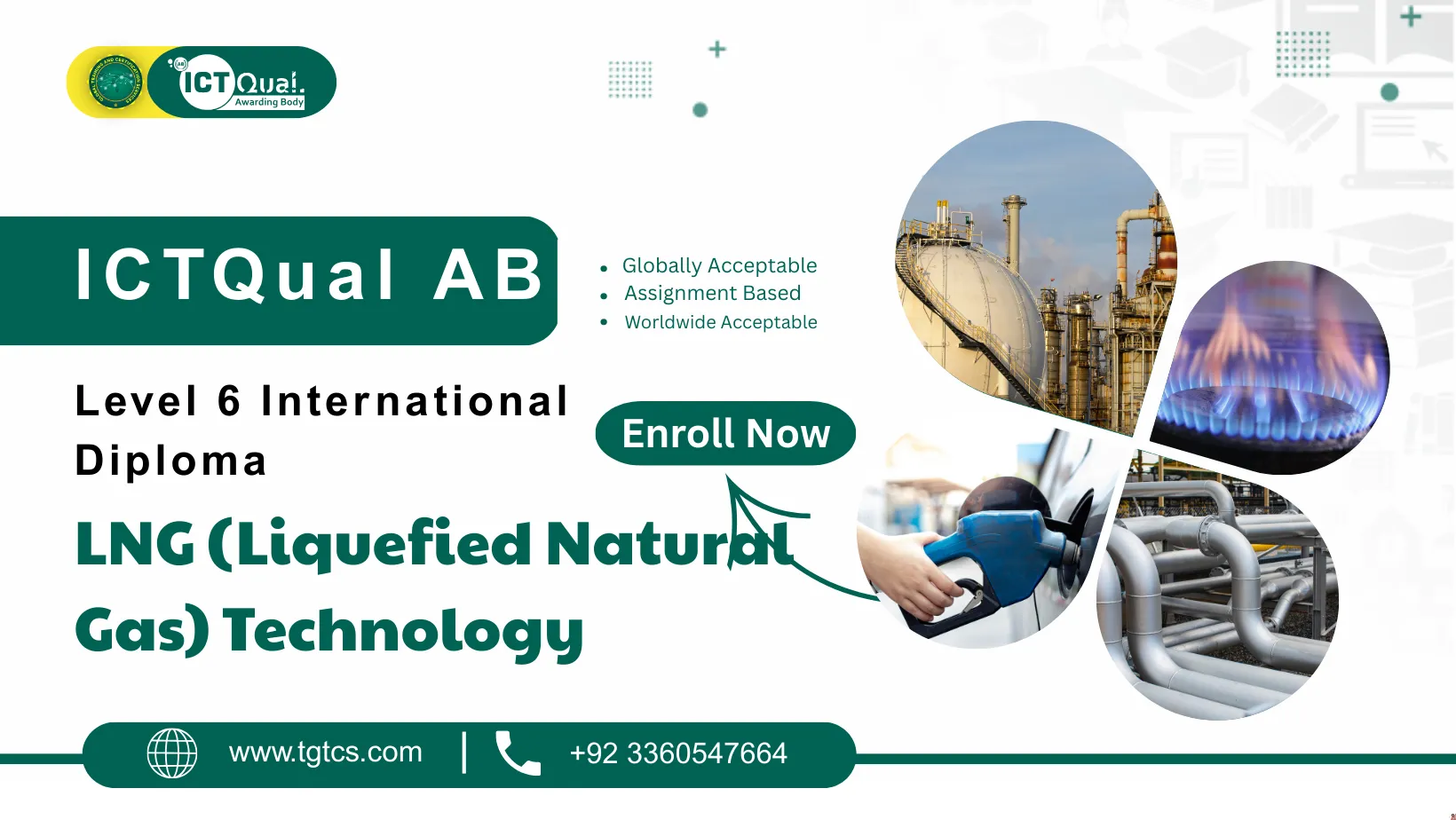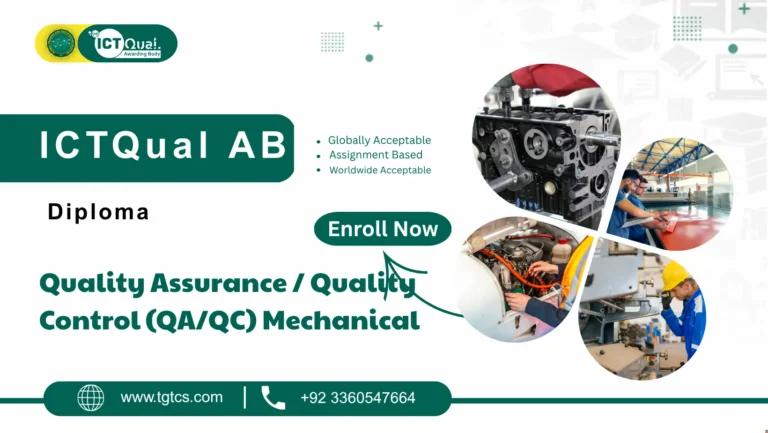ICTQual AB Level 6 International Diploma in LNG (Liquefied Natural Gas) Technology
The ICTQual AB Level 6 International Diploma in LNG (Liquefied Natural Gas) Technology is designed to provide learners with a robust understanding of the technical, operational, and managerial aspects of LNG production, transportation, and storage. This advanced qualification equips professionals with the expertise to meet the increasing demand for skilled personnel in the LNG industry worldwide.
The program spans three years, encompassing 360 credits, and covers an extensive range of subjects including cryogenic engineering, LNG plant operations, regasification processes, LNG transportation systems, safety management, and environmental compliance. Learners will gain both theoretical knowledge and practical skills through a combination of interactive lectures, laboratory work, simulation-based exercises, and real-world case studies. This ensures graduates are not only proficient in the core technical aspects of LNG but also capable of applying strategic and analytical thinking to complex industrial challenges.
Participants in this diploma program will develop critical competencies such as process optimization, risk assessment, operational management, and problem-solving within the LNG sector. Additionally, the course emphasizes global industry standards, safety protocols, and regulatory frameworks, making learners highly competitive in international job markets.
By completing the ICTQual AB Level 6 International Diploma in LNG Technology, graduates will be fully prepared for leadership roles in LNG plants, energy companies, engineering consultancies, and related sectors. The qualification is globally recognized, verifiable by the British Council, and attested by MOFA and embassies, enhancing employability and career progression. This diploma serves as a gateway for professionals seeking to make a tangible impact in the energy industry while advancing their technical expertise and managerial capabilities.
The Global Training and Certification Services is Approved Training Centre of ICTQual AB UK Ltd
The ICTQual AB Level 6 International Diploma in LNG Technology is a globally recognized qualification designed to equip learners with advanced knowledge and practical expertise in Liquefied Natural Gas (LNG).
Course Level and Credits
- Level 6 International Diploma, 360 credits.
- Suitable for fresh graduates, experienced professionals, and industry practitioners seeking advanced knowledge in LNG technology.
Mode of Study
- Fully assignment-based; learn at your own pace.
- Accessible from anywhere in the world, flexible for working professionals and students.
Global Recognition & Attestation
- British Council verifiable, MOFA and Embassy attested.
- Recognized for career advancement, employment, and Iqama approval in Gulf countries.
Scope and Purpose
- Comprehensive coverage of LNG production, plant operations, transportation, storage, safety protocols, and regulatory compliance.
- Focus on both theoretical understanding and practical application in real-world LNG operations.
Skills and Knowledge Gained
- LNG plant management, cryogenic engineering, regasification processes, and transportation logistics.
- Safety management, risk assessment, operational efficiency, and strategic decision-making in the LNG sector.
- Enhanced analytical, technical, and managerial skills for leadership roles in global energy markets.
Career Benefits
- Opens opportunities in LNG plants, energy companies, engineering consultancies, and project management roles.
- Enhances professional credibility and employability in the international energy sector.
Target Audience
- Fresh graduates aiming for a career in LNG and energy industries.
- Experienced professionals seeking certification based on relevant industry experience.
- Engineers, managers, and technical specialists looking to advance their knowledge and career globally.
Unique Selling Points (USPs)
- Flexible self-paced learning, fully assignment-based.
- Prestigious and globally recognized Level 6 diploma.
- Suitable for both fresh learners (36 assignments in 3 years) and experienced professionals (fast-track via professional discussions).
- British Council verifiable, MOFA and Embassy attested—ideal for job opportunities and Iqama approval.
Mandatory Unit
This qualification, the ICTQual AB Level 6 International Diploma in LNG (Liquefied Natural Gas) Technology, consists of 36 mandatory units.
Year 1 – Foundation in LNG Technology
- Principles of Chemical and Process Engineering
- Introduction to Liquefied Natural Gas (LNG)
- Natural Gas Properties and Analysis
- LNG Production Processes Overview
- Cryogenic Principles and Applications
- Heat and Mass Transfer in LNG Systems
- Introduction to LNG Plant Equipment and Technology
- Process Instrumentation and Control Basics
- Health, Safety, and Environmental Awareness
- Industrial Laboratory Techniques
- Technical Report Writing
- Introduction to LNG Simulation Software
Year 2 – Intermediate LNG Technology
- Advanced LNG Liquefaction Processes
- Gas Pretreatment and Sweetening Techniques
- Refrigeration Cycles and Cryogenic Operations
- Process Control and Automation in LNG Plants
- Energy Management and Efficiency in LNG Operations
- LNG Storage and Tank Design
- Process Safety Management and Hazard Analysis
- LNG Transportation and Pipeline Technology
- Quality Control and Assurance in LNG Production
- Environmental Management and Sustainability
- LNG Blending and Product Optimisation
- Data Analysis and Technical Communication
Year 3 – Advanced LNG Technology
- Advanced LNG Plant Optimisation and Troubleshooting
- LNG Project Management and Planning
- Advanced Cryogenic Engineering and Heat Exchangers
- LNG Process Simulation and Modelling
- Corrosion, Maintenance, and Reliability in LNG Systems
- Energy Transition and Cleaner LNG Technologies
- Risk Assessment and Emergency Response
- Advanced Laboratory Techniques and Process Testing
- Supply Chain and Logistics in LNG Operations
- Capstone Project in LNG Technology
- Professional Development and Leadership in Energy
- Strategic Decision-Making in LNG Plant Management
The ICTQual AB Level 6 International Diploma in LNG Technology is designed to equip learners with advanced technical knowledge, practical skills, and strategic expertise essential for a successful career in the global LNG industry.
Year 1 – Foundation in LNG Technology
Principles of Chemical and Process Engineering
- Understand fundamental chemical engineering concepts applied in LNG operations.
- Apply process engineering principles to LNG system design and operation.
- Analyze fluid dynamics, thermodynamics, and mass balances in LNG processes.
- Develop problem-solving skills for chemical process challenges in LNG plants.
Introduction to Liquefied Natural Gas (LNG)
- Explain the LNG value chain from production to distribution.
- Understand LNG’s role in the global energy market and supply chain.
- Identify advantages, limitations, and applications of LNG.
- Explore LNG’s contribution to cleaner energy transition strategies.
Natural Gas Properties and Analysis
- Recognize the physical and chemical properties of natural gas.
- Perform gas composition analysis for LNG production optimization.
- Understand gas quality standards and specifications for liquefaction.
- Apply laboratory techniques to evaluate natural gas feedstocks.
LNG Production Processes Overview
- Describe the stages of LNG production from extraction to liquefaction.
- Understand the role of refrigeration and cryogenics in LNG plants.
- Analyze process flow diagrams (PFDs) of LNG systems.
- Evaluate operational challenges in LNG production processes.
Cryogenic Principles and Applications
- Understand the science of cryogenics and its industrial importance.
- Apply cryogenic principles in LNG storage and transportation.
- Identify cryogenic equipment used in LNG plants.
- Explore safety practices in cryogenic handling.
Heat and Mass Transfer in LNG Systems
- Explain mechanisms of heat and mass transfer in LNG operations.
- Apply heat exchanger principles to LNG process equipment.
- Understand thermal management in liquefaction and regasification.
- Analyze process performance using heat and mass balance calculations.
Introduction to LNG Plant Equipment and Technology
- Identify key equipment used in LNG plants and their functions.
- Understand LNG plant layout and process integration.
- Explore LNG compressors, turbines, pumps, and exchangers.
- Analyze operational efficiency of LNG equipment.
Process Instrumentation and Control Basics
- Understand the role of instrumentation in LNG process monitoring.
- Identify types of sensors, transmitters, and control systems.
- Apply process control fundamentals to LNG plant operations.
- Explore digital technologies in LNG plant automation.
Health, Safety, and Environmental Awareness
- Understand HSE regulations specific to LNG operations.
- Identify workplace hazards and risk mitigation strategies.
- Apply safety protocols in LNG plant operations.
- Explore LNG’s environmental impacts and sustainability practices.
Industrial Laboratory Techniques
- Apply laboratory methods for LNG-related experiments.
- Understand sampling techniques for gases and liquids.
- Develop analytical skills using laboratory equipment.
- Ensure accuracy and reliability in technical testing.
Technical Report Writing
- Develop professional technical reports for LNG projects.
- Understand industry-standard documentation practices.
- Apply data presentation and analysis in reports.
- Communicate complex technical information effectively.
Introduction to LNG Simulation Software
- Understand the role of simulation in LNG plant design.
- Apply basic LNG simulation software for process modeling.
- Analyze system performance using digital tools.
- Explore software applications in optimization and troubleshooting.
Year 2 – Intermediate LNG Technology
Advanced LNG Liquefaction Processes
- Compare different liquefaction technologies (C3MR, DMR, SMR).
- Understand thermodynamic cycles in advanced LNG liquefaction.
- Analyze process efficiency and optimization techniques.
- Explore future trends in liquefaction technology.
Gas Pretreatment and Sweetening Techniques
- Understand impurities removal in natural gas processing.
- Apply techniques for acid gas removal and dehydration.
- Analyze gas sweetening methods for LNG production.
- Ensure compliance with gas quality standards.
Refrigeration Cycles and Cryogenic Operations
- Explain refrigeration principles in LNG plants.
- Analyze different refrigeration cycles used in liquefaction.
- Apply cryogenic operation principles for efficiency.
- Troubleshoot refrigeration system challenges.
Process Control and Automation in LNG Plants
- Apply automation principles in LNG production.
- Explore Distributed Control Systems (DCS) and SCADA in LNG.
- Analyze advanced control strategies for stability and safety.
- Understand digital transformation in LNG operations.
Energy Management and Efficiency in LNG Operations
- Identify energy-intensive stages of LNG production.
- Apply strategies for reducing energy consumption.
- Explore renewable integration in LNG operations.
- Analyze energy performance indicators in LNG plants.
LNG Storage and Tank Design
- Understand LNG storage principles and technologies.
- Analyze structural design of cryogenic tanks.
- Explore safety and operational standards for storage.
- Evaluate new advancements in LNG tank technology.
Process Safety Management and Hazard Analysis
- Apply hazard identification methods in LNG facilities.
- Conduct risk assessments for LNG operations.
- Explore international safety management standards.
- Develop mitigation strategies for LNG process risks.
LNG Transportation and Pipeline Technology
- Understand LNG shipping methods and technologies.
- Explore LNG bunkering and fueling systems.
- Analyze LNG pipeline design and operations.
- Evaluate global LNG transportation logistics.
Quality Control and Assurance in LNG Production
- Apply quality assurance methods in LNG processes.
- Understand testing and verification procedures.
- Analyze LNG product quality standards.
- Explore continuous improvement in LNG operations.
Environmental Management and Sustainability
- Apply environmental management systems in LNG operations.
- Explore carbon reduction strategies in LNG production.
- Understand LNG’s role in energy transition and climate goals.
- Evaluate environmental compliance and regulations.
LNG Blending and Product Optimisation
- Understand LNG blending techniques for market specifications.
- Analyze gas composition adjustment strategies.
- Apply optimization methods for LNG product value.
- Ensure compliance with customer and market demands.
Data Analysis and Technical Communication
- Apply data analytics in LNG plant monitoring.
- Understand statistical tools for LNG process analysis.
- Develop technical presentations for stakeholders.
- Communicate results using professional data visualization.
Year 3 – Advanced LNG Technology
Advanced LNG Plant Optimisation and Troubleshooting
- Apply advanced troubleshooting techniques in LNG plants.
- Optimize LNG processes for efficiency and cost reduction.
- Understand predictive maintenance in LNG facilities.
- Explore digital twins and AI-driven optimization.
LNG Project Management and Planning
- Understand LNG project lifecycle and planning stages.
- Apply project management methodologies in LNG projects.
- Analyze budgeting, scheduling, and resource allocation.
- Explore risk and stakeholder management in LNG projects.
Advanced Cryogenic Engineering and Heat Exchangers
- Understand advanced design principles of cryogenic equipment.
- Analyze LNG heat exchanger performance and design.
- Explore new cryogenic engineering technologies.
- Apply advanced troubleshooting in cryogenic systems.
LNG Process Simulation and Modelling
- Apply advanced LNG simulation software for process analysis.
- Develop models for LNG plant optimization.
- Understand dynamic simulation in LNG operations.
- Explore virtual testing of LNG systems.
Corrosion, Maintenance, and Reliability in LNG Systems
- Identify corrosion types affecting LNG facilities.
- Apply preventive maintenance strategies.
- Understand asset integrity management in LNG plants.
- Explore reliability-centered maintenance approaches.
Energy Transition and Cleaner LNG Technologies
- Explore LNG’s role in decarbonization strategies.
- Understand carbon capture and cleaner production methods.
- Analyze renewable-LNG integration solutions.
- Evaluate future cleaner technologies in LNG industry.
Risk Assessment and Emergency Response
- Conduct advanced risk analysis in LNG plants.
- Apply emergency response planning in LNG operations.
- Understand regulatory requirements for risk management.
- Explore case studies on LNG incidents and lessons learned.
Advanced Laboratory Techniques and Process Testing
- Apply advanced LNG testing methods in laboratories.
- Explore specialized LNG measurement techniques.
- Ensure data accuracy and reliability in testing.
- Develop advanced experimental research skills.
Supply Chain and Logistics in LNG Operations
- Understand LNG global supply chain management.
- Explore LNG terminal and port logistics.
- Analyze transportation economics and trading strategies.
- Apply supply chain optimization methods.
Capstone Project in LNG Technology
- Apply research and problem-solving to LNG challenges.
- Develop a comprehensive project integrating LNG knowledge.
- Present professional findings to industry standards.
- Demonstrate technical and analytical competencies.
Professional Development and Leadership in Energy
- Understand leadership skills in energy sector roles.
- Apply professional ethics and responsibility in LNG projects.
- Develop team management and communication skills.
- Explore career growth opportunities in LNG technology.
Strategic Decision-Making in LNG Plant Management
- Apply strategic planning methods in LNG management.
- Understand decision-making models for complex LNG operations.
- Analyze case studies in LNG business management.
- Explore global LNG market trends for strategic growth.
The ICTQual AB Level 6 International Diploma in LNG Technology is designed to prepare professionals with advanced technical knowledge, practical skills, and industry insights required for success in the global LNG sector.
Global Career Opportunities
- Gain specialized expertise highly valued by LNG companies worldwide.
- Access international job roles in LNG plants, terminals, shipping, and energy corporations.
Advanced Technical Competence
- Master LNG production, storage, transportation, and regasification processes.
- Develop in-depth knowledge of cryogenic systems, process control, and plant optimization.
Industry-Relevant Practical Skills
- Learn hands-on techniques using LNG simulation software and laboratory tools.
- Apply real-world troubleshooting and problem-solving strategies in LNG operations.
Safety, Sustainability, and Compliance Focus
- Understand HSE (Health, Safety, and Environment) standards specific to LNG plants.
- Explore sustainable LNG practices and global environmental compliance frameworks.
Leadership and Professional Development
- Build project management and decision-making skills for LNG operations.
- Enhance leadership potential for supervisory and managerial roles in energy industries.
By completing the ICTQual AB Level 6 International Diploma in LNG Technology, learners will be equipped with the knowledge, skills, and professional expertise to excel in global LNG operations, advance their careers, and contribute to sustainable energy development.
The ICTQual AB Level 6 International Diploma in LNG Technology is designed for learners aiming to enhance their technical expertise, safety knowledge, and leadership skills in the global LNG industry. This program is best suited for the following:
Early-Career Engineers
- Seeking to build strong foundations in LNG processes and cryogenic systems.
- Looking for practical skills that support career advancement in energy.
Energy Industry Professionals
- Working in oil, gas, or LNG operations who want to specialize in LNG technology.
- Aiming to expand international career opportunities in the energy sector.
Health, Safety, and Compliance Officers
- Focused on improving knowledge of LNG-specific safety and environmental standards.
- Interested in advancing skills in hazard analysis, risk management, and compliance.
Supervisors and Future Managers
- Preparing to take on leadership and decision-making roles in LNG operations.
- Looking to develop project management and professional development expertise.
Graduates Aspiring for LNG Careers
- Fresh graduates in engineering or related fields seeking LNG specialization.
- Interested in entering the global LNG workforce with a recognized qualification.
The ICTQual AB Level 6 International Diploma in LNG Technology is tailored for engineers, professionals, managers, and graduates who want to succeed in the fast-growing LNG industry with advanced technical knowledge and international recognition.
Course Overview
Course Level
Level 6
Course Units
36 Units
Credits
360
Duration
3 years






